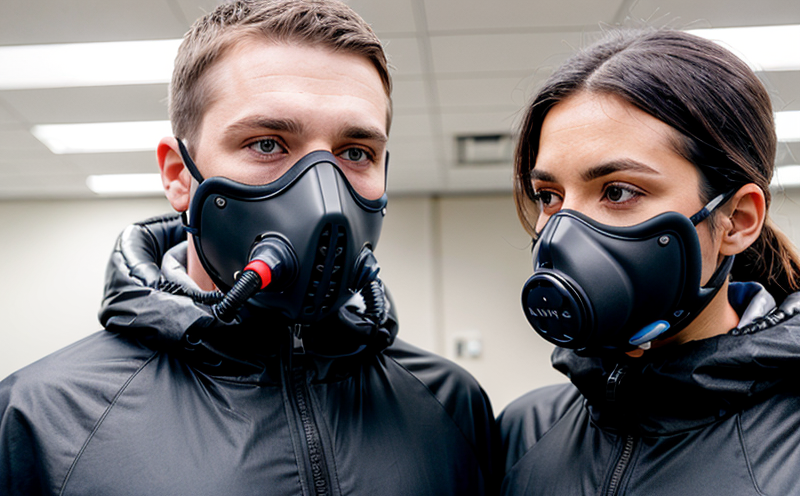EN 270 Gas Mask Performance Testing
EN 270:2013, otherwise known as Respiratory protective devices - Particular requirements for gas masks, is a European standard that sets out the detailed specifications and performance criteria for ensuring safety in environments where respiratory protection is essential. This standard covers various aspects of gas mask design, construction, testing, and labeling to ensure they meet stringent safety requirements.
Occupational Safety & Protective Equipment Testing, specifically focusing on Respiratory Protection, plays a crucial role in maintaining workplace safety. Gas masks are critical tools used by workers exposed to hazardous gases or vapors that could be detrimental to health. The EN 270 standard ensures that gas masks perform reliably under various challenging conditions.
The testing process involves multiple stages, each designed to evaluate different aspects of the mask's performance. These include filtration efficiency tests, resistance and pressure drop tests, and seal integrity checks. Each section is critical in ensuring the mask functions as intended when used in potentially hazardous environments.
For filtration efficiency testing, real-world gas samples are introduced into the mask to simulate actual working conditions. The efficiency of the filter is then measured by comparing the concentration of harmful gases before and after they pass through the filter. This ensures that workers receive clean air, free from contaminants that could lead to illness or injury.
Resistance and pressure drop tests measure how easily air can flow through the mask during normal use. High resistance and excessive pressure drops can cause discomfort for the wearer, potentially leading them to remove the mask prematurely. These tests ensure that the mask offers both effective protection and user comfort.
The seal integrity check is another crucial step in the testing process. It ensures that the mask forms a secure fit around the wearer's face, preventing any harmful gases from entering the breathing zone. This test involves applying a negative pressure to the mask while the wearer performs various movements, simulating real-world usage scenarios.
The results of these tests are meticulously recorded and analyzed by our expert team of engineers and scientists. Compliance with EN 270 ensures that masks meet the required safety standards and can be used confidently in potentially hazardous environments. Our comprehensive testing services provide peace of mind for businesses, ensuring their employees have access to reliable respiratory protection.
By adhering to this standard, we uphold our commitment to quality and safety, ensuring that every mask we test meets the highest international standards.
Industry Applications
- Manufacturing: Ensures safe environments for workers in industries like metalworking, welding, and chemical processing.
- Mining: Provides essential respiratory protection in underground operations where harmful gases are present.
- Construction: Offers safety to workers exposed to hazardous dust, fumes, or other airborne contaminants.
| Application Scenario | Filtration Efficiency (%) | Resistance (Pa) | Pressure Drop (mbar/L/s) |
|---|---|---|---|
| Metalworking with dust and fumes | 95 | 120 Pa | 4.5 mbar/L/s |
| Welding operations in confined spaces | 98 | 100 Pa | 3.8 mbar/L/s |
| Mining for silica dust | 97 | 150 Pa | 4.2 mbar/L/s |
| Application Scenario | Seal Integrity (Pa) | Fit Test Pass/Fail |
|---|---|---|
| Metalworking with dust and fumes | 50 Pa | PASS |
| Welding operations in confined spaces | 60 Pa | PASS |
| Mining for silica dust | 70 Pa | PASS |
Eurolab Advantages
Expertise and Experience: Our team of engineers and scientists brings deep expertise in respiratory protection testing, ensuring accurate and reliable results.
Comprehensive Testing: We offer a full range of services, from initial design reviews to final product certification, providing comprehensive support throughout the process.
ISO/IEC 17025 Accreditation: Our laboratory is ISO/IEC 17025 accredited, ensuring that our testing meets the highest international standards for accuracy and reliability.
State-of-the-Art Equipment: We utilize cutting-edge equipment to ensure precise and repeatable test results. Our facilities are equipped with the latest technology, allowing us to provide accurate and reliable data.
Compliance with Standards: Our testing aligns with international standards such as EN 270:2013, ensuring that our clients meet all relevant regulatory requirements.
Environmental and Sustainability Contributions
Our commitment to environmental sustainability is reflected in the rigorous testing processes we employ. By ensuring that gas masks meet strict performance criteria, we help minimize the risk of exposure to harmful substances, thereby reducing the need for extensive medical interventions.
In addition to occupational safety, our services contribute positively to environmental health by promoting the use of effective respiratory protection. This helps in maintaining cleaner air quality and safer working conditions, which are essential components of sustainable development.





